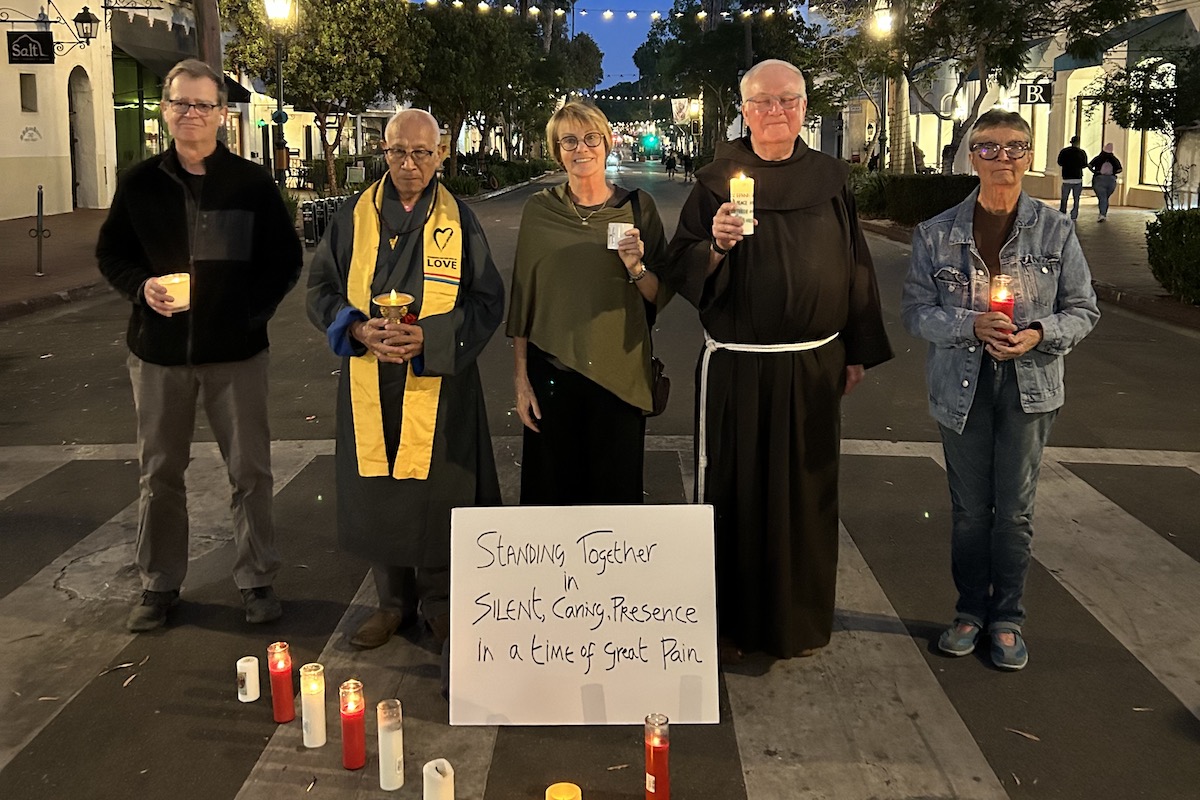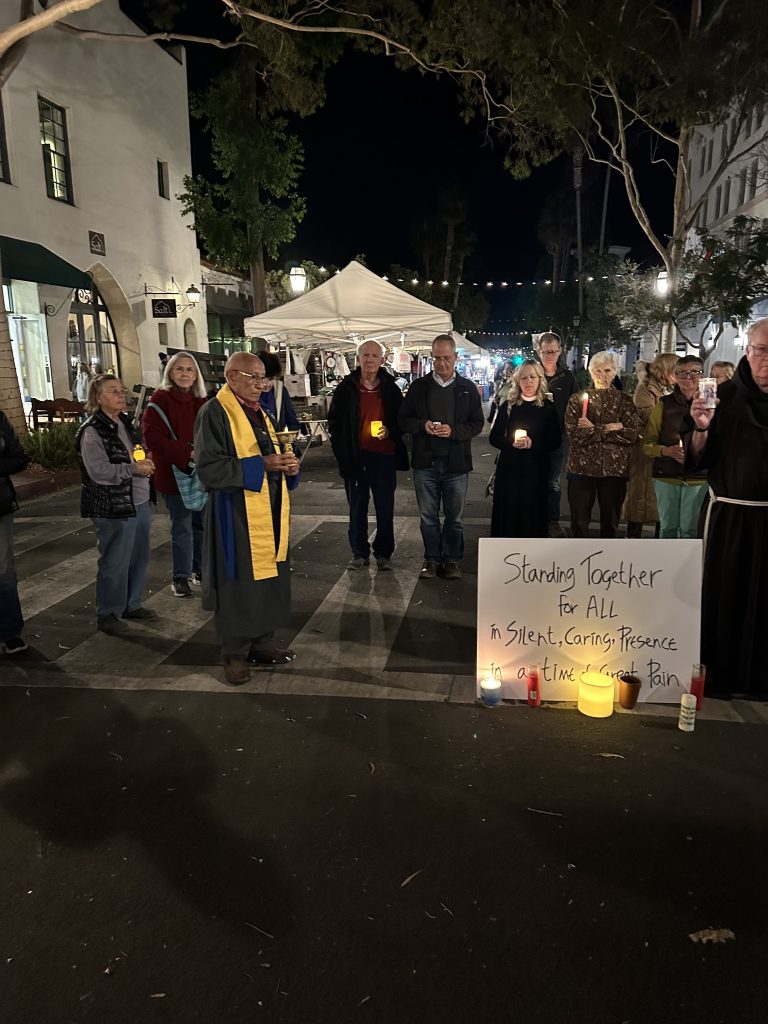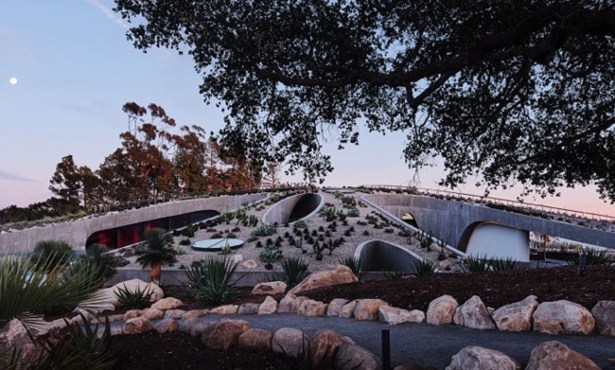Standing Together with Silent, Caring Presence
Psychologist and Meditation Teacher Explores Using Community Connection as an Antidote for Anguish

For the fourth night in a row, I woke up at 3 a.m., wide-eyed and terrified. The horrible attack on ordinary Israeli civilians had occurred, and the counterattack on Hamas, killing great numbers of the Palestinian population, was rapidly escalating. As a post-war German, living in the U.S. since I was 27, I felt tossed about by a kind of emotional whiplash. I had internalized German guilt and responsibility for the Jewish cause, but this was in conflict with the horrific sight of so many Palestinian people suffering and dying. Feelings of outrage and dismay expressed by my psychotherapy clients and meditation students, including Jews, Palestinians, and Syrians, contributed to my own deep anguish.
I shared my grief with some of my interfaith colleagues. We thought it might be helpful to plan an event where leaders of the different spiritual and religious groups could talk about peace. Soon it became apparent that an open event in a public place might be too risky. There were worries that “peace” might be too charged a word. There seemed to be so many controversial meanings attached to these five letters. Peace, as a word, had become politicized.

With a core group of five, we tried to decipher the right way to go forward. “Suffering is pain in isolation,” Michael, my hospice doctor husband, said and added, “When we are isolated and all alone in our pain, then our suffering becomes unbearable.” We realized that we and countless others were suffering moral distress, a condition that arises when one feels an impulse to relieve suffering but external constraints make it impossible to do so.
News about terrorist attacks, war, oppression, and gun violence is hitting us daily from all sides. Millions of us feel disheartened and experience anxiety, insomnia, depression, or nightmares when facing the untenable reality that too many in our human community are treated without compassion and aren’t able to receive basic humanitarian care.
The planning team was ready to give up. Then Fr. Larry, the Franciscan monk, called me and urged us to do something. Father Larry; Thepo Tulku, a Tibetan lama; Debbie, a Christian activist for the homeless; my husband, Michael; and I met in our living room. Debbie told us about the “Women in Black,” a worldwide group standing in silent mourning for peace and justice and against violence and war. The idea crystallized. We decided to stand quietly together in a public place in town, holding a candle with a sign that says, “Standing Together with Silent and Caring Presence for All in a Time of Great Pain.”
Why did we choose to do it this way? This is a time when we are flooded with too many words and polarized opinions. We felt we had to find a caring, safe, neutral place to meet. Our intention for standing in caring, silent presence was to give ourselves and others an opportunity to gather in solidarity with ALL those who are suffering in unimaginable ways, near and far.
To be present to someone in pain is a form of action, a quiet action. “Present together” is the opposite of being alone, in isolation with unbearable suffering. To do this “in silence” means to not take sides with words. In Tibetan Buddhism, the word “equanimity” means “having no preference” in our willingness to feel empathy for others. “Caring” means that we keep our hearts open, no matter what. Webster’s dictionary tells us that “caring” includes “being affectionate, kind, helpful, gentle, loving, and thoughtful.”
“Kindness is my religion,” the Dalai Lama said. It is very difficult to aspire to such an ideal, but, if we were to live by this, it would offer a life-giving alternative. Pope Francis said, “Love, overflowing with … mutual care, is civic and political, and makes itself felt in every action that seeks to build a better world.”
Sign up for Indy Today to receive fresh news from Independent.com, in your inbox, every morning.
The word “together” implies that we are standing for something that is bigger than our individual personhood, our personal bubble, or maybe even our human bubble. It means that we recognize ourselves as part of the interwoven web of life. The matrix of life sustains and connects us all, and we need to respect and take care of it in return.
Now we are standing together on State and De la Guerra streets, every Tuesday from 6-7 p.m. At first, just five of us stood there, then more and more gathered, including a rabbi and a Palestinian family. Yet, the war rages on. In the midst of it all, we may be feeling like Sisyphus, who was condemned by the gods to do an endless task for all eternity. Each day, he struggled to roll a huge stone to the top of a mountain only to watch it roll back down again. Some see Sisyphus as the quintessential sufferer, condemned to repeat hopeless and meaningless tasks. We might feel like Sisyphus: “another Tuesday, another stone,” or “another day and no pause in the war.”
I see Sisyphus as deeply present with what is; he embraces the absurd, which philosopher Albert Camus saw as the result of our desire for meaning in a meaningless world. Sisyphus realized that in tending to the part, he is tending to the whole. In engaging with his own world, by showing an attitude of mindfulness, kindness, and complete presence, Sisyphus engages with the entire world. I keep coming back to this fundamental understanding: As we are taking care of our personal world with kind attention, we are also taking care of the whole.
How would it be if all of us viewed our tasks in a fresh way? Not as the burden of Sisyphus pushing his personal stone up the hill, but as the common burden belonging to all of us together engaging with the rough and heavy boulder of our “human condition”? We could see each small act as one of compassion, solidarity, and understanding. Together we all share the task of moving the stone of our human condition forward, and in pushing a difficult task ahead with grace, humility, and presence, we give meaning to our lives.
Having studied history moving through its easier periods and terrible convulsions, I have gained a certain trust in our heart’s intention, in meaning, and in practice. The Dalai Lama spoke about the importance of trusting our heart’s intention with love. Intention is the light in the darkness, shining forward, like our candles on Tuesday evenings. We are holding the intention to contribute with our presence to ourselves and to the whole.
As I personally reflect on my own engagement, I feel a sense of sorrow as well as of freedom. In this project of standing together, we are propelled forward by our own choice and by the tenderness we share.
Radhule Weininger, PhD, MD is a psychologist and mindfulness meditation teacher. See mindfulheartprograms.org for more information.




You must be logged in to post a comment.